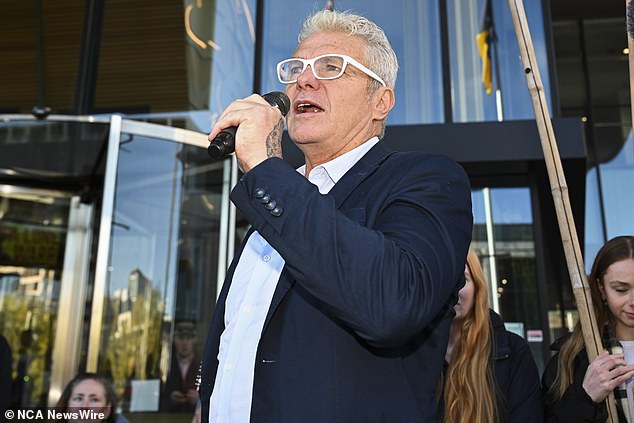A man who leaked classified military documents revealing allegations Australian soldiers committed war crimes in Afghanistan will spend at least two years and three months behind bars.
David McBride, 60, has been sentenced to almost six years in prison after pleading guilty to leaking classified documents revealing alleged war crimes.
Judge David Mossop sentenced McBride to a total of five years and eight months in prison on three charges in the ACT Supreme Court on Tuesday.
The former military lawyer will have a non-parole period of 27 months, meaning he will remain behind bars until at least August 2026.
McBride took 235 documents, 207 classified as secret, printing them at different defense facilities and removing them in his backpack.
The classification indicates that its disclosure could seriously harm the national interest or individuals, including loss of life.
David McBride (pictured) has been sentenced to almost six years in prison after pleading guilty to leaking classified documents revealing alleged war crimes.
The leaked documents led to reports about Australian special forces soldiers committing alleged war crimes.
An investigation later found credible information about 23 incidents of possible war crimes, involving the murder of 39 Afghans between 2005 and 2016.
Lawyers and human rights advocates argued that punishing whistleblowers would have a chilling effect on freedom of expression and scare people into not exposing wrongdoing.
In court on Tuesday, Judge Mossop said McBride’s actions were a “serious breach of trust” in his position as a lawyer.
There was a significant need to deter similar actions in the future, but there was also a need to consider McBride’s mental deterioration due to a prison sentence, the judge said.
But he accepted McBride was of good character after numerous character references and a report from a clinical psychologist outlining his morality and sense of justice.
McBride believed that soldiers were being improperly investigated for the war crime of murder for actions that did not meet that threshold due to political interference to show the public that the defense forces were taking the incidents seriously.

The former military lawyer’s actions were a “serious breach of trust” in his position as a lawyer, Judge Mossop told the court (McBride is pictured in Afghanistan).

Judge David Mossop sentenced McBride (pictured) to a total of five years and eight months in prison on three charges in the ACT Supreme Court on Tuesday.
Judge Mossop concluded that he did not act for financial gain or to assist any adversary.
But he did not accept McBride’s claim that he thought he was not committing a criminal offense after the former military lawyer said he believed he would ultimately be vindicated by a court for acting in the public interest.
McBride made “vague and non-detailed statements” about criminal behavior by senior defense officials, the judge said.
But he accepted that poor mental health affected by depression and post-traumatic stress disorder, self-medicated with alcohol and substance abuse, “contributed materially, however minor, … to crime.”
Speaking to supporters outside the court before his sentencing, McBride said he had never been prouder to be an Australian.
He maintained that he did his duty by exposing the irregularities.
“I did not break my oath to the people of Australia and the soldiers who keep us safe,” he said.
Prosecutors had pushed for the former military lawyer to spend a minimum of two years behind bars to reflect the seriousness of his crime, but his lawyers asked for leniency, saying what he did was in the public interest.


